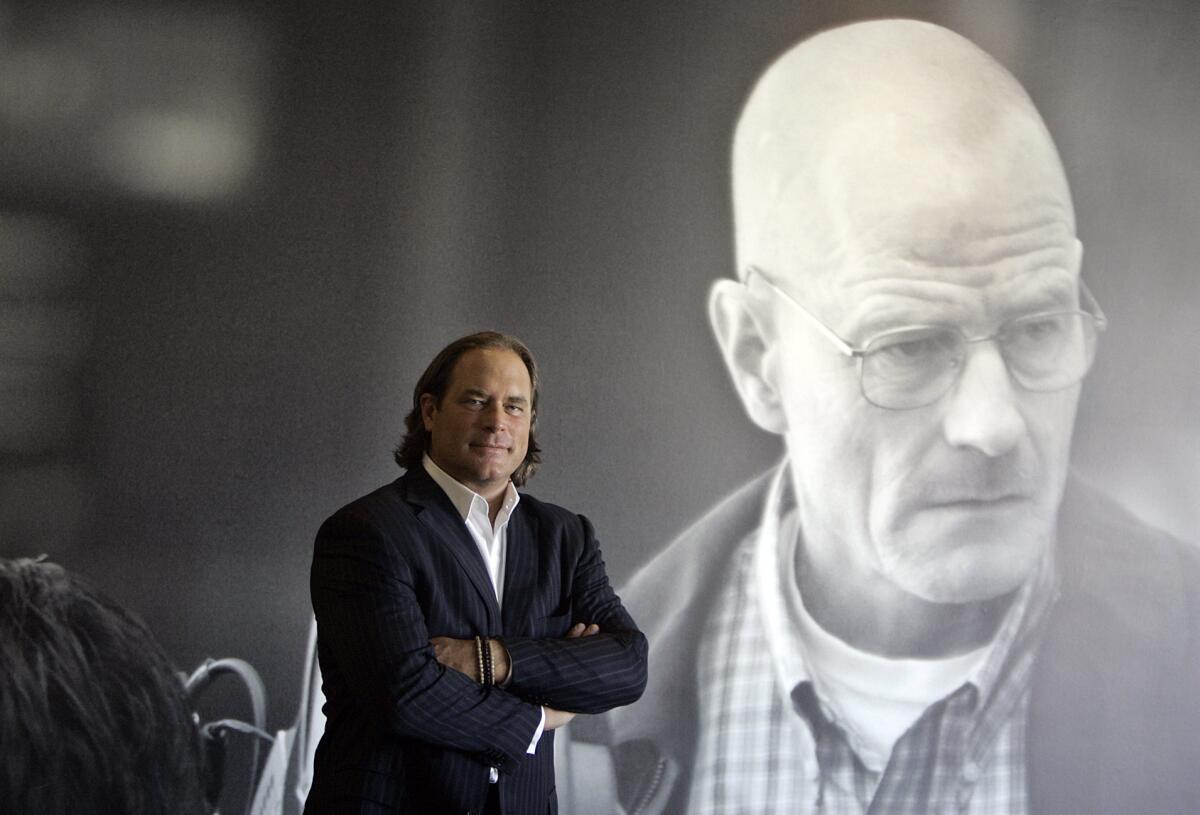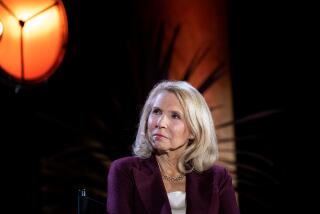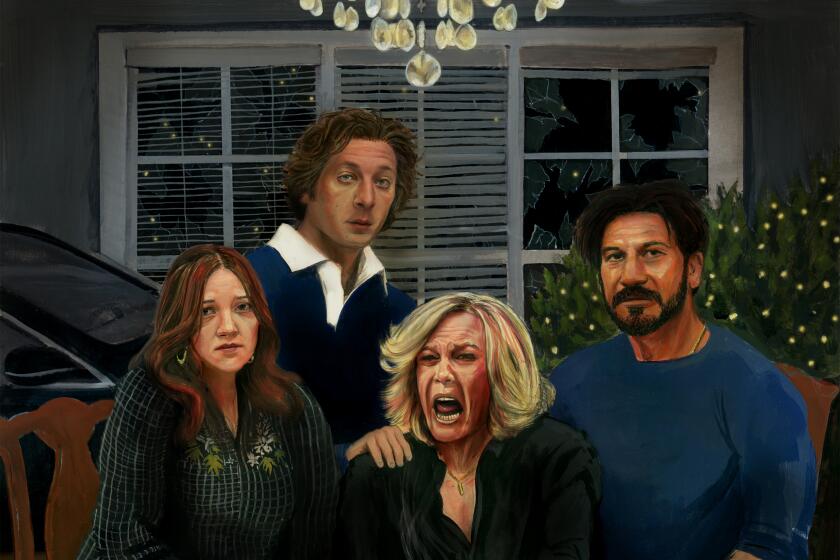Steve Mosko to exit as Sony TV chairman

Sony Pictures Television Chairman Steve Mosko is leaving the company after more than two decades building the Culver City television operation into a quiet giant behind such hits such as “Breaking Bad,” “The Blacklist” and “Jeopardy.”
His abrupt and unexpected exit Wednesday comes just nine months after Mosko was promoted to chairman of Sony Pictures Television after serving for years as president. The promotion recognized his value to Sony’s entertainment business and his steady hand during the 2014 computer hack that roiled the studio.
Mosko is a hugely popular in Hollywood, but several people on Wednesday noted that he often clashed with his boss, Michael Lynton, who is chairman and chief executive of Sony Pictures Entertainment.
The two executives were in the midst of negotiating a new agreement to replace Mosko’s employment contract that was due to expire this fall.
Sony declined to comment. Late Wednesday, Mosko said in an email to The Times: “All good.....great run!!! More to do!!!”
His departure, confirmed by a person close to the situation who asked not to be identified, represents the latest major shakeup involving a high-level television executive this year. In February, Walt Disney Co.’s ABC tossed out the network head of five years, Paul Lee. And this week NBCUniversal ousted its TV studio president, Bela Bajaria.
But Mosko, 60, was something of an institution. The jocular Baltimore native started in the TV station business and worked his way up the ranks after starting at Sony in 1992. He is known for cutting through red tape and being deft at handling big egos, such as when one of Sony’s stars, Joel McHale, demanded a 65-inch 4K ultra-high-definition Sony TV, which McHale later conceded was part of a fit of pique when he was brooding about the cancellation of his sitcom “Community.”
“How much is it?” Mosko typed in an email to his longtime assistant after McHale demanded the expensive TV. “Just get it... deal w money later.” The email was among the confidential documents revealed during the hack.
Though it does not own its own broadcast network, Sony is a prolific producer of hit TV shows. The studio produces such syndicated juggernauts as “Jeopardy” and “Wheel of Fortune,” as well as such prime-time hits as “The Blacklist” for NBC, “The Goldbergs” and “Shark Tank” for ABC, “Outlander” for Starz, and “Masters of Sex” for Showtime. Sony also produced the critically acclaimed series, “Breaking Bad” and its spinoff “Better Call Saul” for AMC. The studio has long distributed daytime soap operas “The Young and the Restless” and “Days of Our Lives.”
Mosko also oversaw Sony’s streaming service Crackle, which distributes Jerry Seinfeld’s Web series “Comedians in Cars Getting Coffee.” He also was responsible for running Sony’s international TV business, which boasts channels in more than 150 countries.
Lynton is expected to name a new TV management team in the coming days.
Sony’s success in the TV business stands in contrast to its feature film division. Though the company enjoyed solid ticket sales for its recent animated release, “The Angry Birds Movie,” the film studio has lagged behind competitors with disappointments such as “Pride and Prejudice and Zombies” and “The Brothers Grimsby.”
The film studio currently ranks last among the six Hollywood majors in terms of domestic market share, according to Box Office Mojo, behind Disney, 20th Century Fox, Warner Bros., Universal and Paramount. In 2015, Sony ranked fifth in U.S.-Canada ticket sales, ahead of Paramount.
Sony has high hopes for its major summer gamble, a reboot of “Ghostbusters” starring comedians Melissa McCarthy and Kristen Wiig.
In September, the company gave Mosko the title of chairman of its television unit in a move that underscored TV’s growing importance. The title change also was seen as a way to create parity with Tom Rothman, who was named chairman of the company’s motion picture group after the departure of longtime studio head Amy Pascal following the Sony hack.
Mosko emerged virtually unscathed from the cyberattack on the studio in 2014 that exposed personal data and emails that were embarrassing to executives, filmmakers and celebrities.
A Sony spokesman declined Wednesday to comment on who might replace Mosko. One studio insider said that rank-and-file executives were floored by the news.
“Whenever you have longstanding relationships that are severed, it takes awhile for the company to regroup its operations and figure out what to do next,” veteran industry analyst Harold Vogel said. “We know television is a very important part of the Sony operation in entertainment, so this is not conducive to smooth functionality over the next three to six months. Sometimes shakeups are good and sometimes they’re bad, but it’s too early to tell.”
The move, first reported by Variety, comes 18 months after the Sony hack. That episode “was -- without question -- the most difficult thing both personally and professionally that I’ve been through in my life,” Mosko said at a digital entertainment conference last year.
He later noted that despite the turmoil, he tried to stay focused on leading his team, and churning out TV show episodes.
“We have been through a lot. …Certain things happen to you in life that either break you or make you unbreakable,” Mosko said during a charity event in November. “And the experience that we have all gone through together has made us one amazing team, and I am proud to be part of that team.”
Times staff writer Yvonne Villarreal contributed to this report.
ALSO:
Keryn Redstone to join legal battle along with Viacom CEO Philippe Dauman
Hundreds take buyouts at 21st Century Fox
NBCUniversal TV President Bela Bajaria departs
UPDATES:
10:31 p.m.: This article was updated to include a comment from Steve Mosko.
4:06 p.m.: This post was updated throughout.
This article was originally published at 2 p.m.
More to Read
From the Oscars to the Emmys.
Get the Envelope newsletter for exclusive awards season coverage, behind-the-scenes stories from the Envelope podcast and columnist Glenn Whipp’s must-read analysis.
You may occasionally receive promotional content from the Los Angeles Times.











